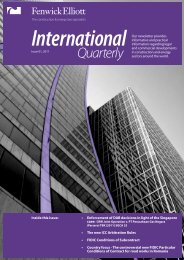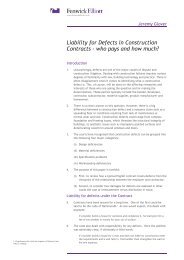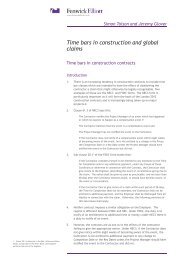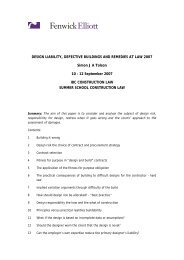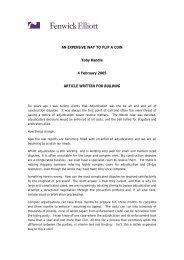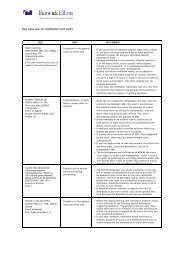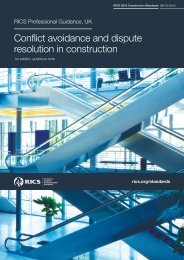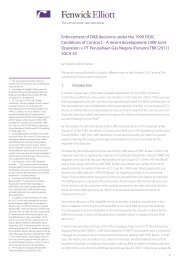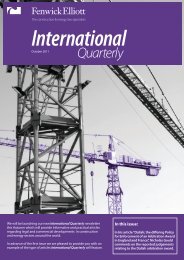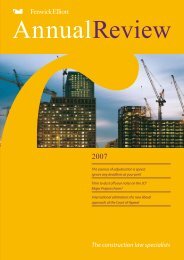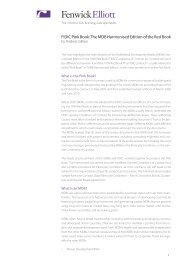CRW Joint Operation v. PT Perusahaan Gas Negara - Fenwick Elliott
CRW Joint Operation v. PT Perusahaan Gas Negara - Fenwick Elliott
CRW Joint Operation v. PT Perusahaan Gas Negara - Fenwick Elliott
Create successful ePaper yourself
Turn your PDF publications into a flip-book with our unique Google optimized e-Paper software.
Universal view:<br />
International dispute resolution & arbitration Issue 01 Winter 2011<br />
dispute. It should therefore be possible<br />
for a winning party to commence a<br />
relatively straightforward arbitration<br />
simply based on the other party’s breach<br />
of Sub-Clause 20.4. Only one condition<br />
should not be overlooked by the winning<br />
party before doing so: that second dispute<br />
must have been first referred to the DAB<br />
and an adequate and timely notice of<br />
dissatisfaction must have been served in<br />
respect of that second DAB decision.<br />
In that respect, the High Court of<br />
Singapore was correct when it concluded<br />
that since the Dispute which <strong>CRW</strong> referred<br />
to arbitration (namely PGN’s non-payment<br />
of the sum set out in the DAB Decision)<br />
had not been first referred to the DAB,<br />
it was plainly outside the jurisdiction of<br />
the Arbitral Tribunal. This was the right<br />
conclusion given the current wording of<br />
Sub-Clause 20.7. Sub-Clause 20.7 makes<br />
clear that the only situation where a party<br />
may refer directly to arbitration the other<br />
party’s failure to give effect to a DAB<br />
decision without having to comply first<br />
with the requirements of Sub-Clause 20.4<br />
[Obtaining Dispute Adjudication Board’s<br />
Decision] and Sub-Clause 20.5 [Amicable<br />
Settlement] is in the event that no party<br />
has expressed dissatisfaction with the DAB<br />
decision and that DAB decision becomes<br />
as a result final and binding. In ICC Case<br />
No. 16122, a notice of dissatisfaction had<br />
been given by PGN, making the DAB<br />
Decision binding but not final. Sub-Clause<br />
20.7 was therefore not applicable.<br />
It will be interesting to see how the<br />
problem of the enforcement of DAB<br />
decisions will be addressed in the second<br />
edition of the 1999 FIDIC Books which<br />
are expected to be published next year.<br />
One approach which the FIDIC Contracts<br />
Committee might adopt will be to amend<br />
Clause 20 along the lines of the FIDIC<br />
Gold Book 2008 by adding in Sub-Clause<br />
20.6 that the DAB decision is binding<br />
and the parties have to comply with it<br />
“notwithstanding that a Party gives a<br />
Notice of Dissatisfaction with such a<br />
decision” and by providing in Sub-Clause<br />
20.7 9 that in the event that a party fails<br />
to comply with a decision of the DAB,<br />
whether binding or final and binding,<br />
then the other party may refer the failure<br />
itself to arbitration without having to refer<br />
first that matter to the DAB and then to<br />
wait for the amicable settlement period to<br />
expire.<br />
These amendments would bring<br />
more certainty to what is currently an<br />
ambiguous section of the 1999 suite<br />
of FIDIC contracts and would no<br />
doubt give parties more faith in the<br />
DAB process and its outcome.<br />
A full version of this article was<br />
published in the September<br />
2011 issue of the International<br />
Construction Law Review.<br />
Frederic Gillion, Partner<br />
<strong>Fenwick</strong> <strong>Elliott</strong><br />
+44 (0)207 421 1986<br />
fgillion@fenwickelliott.com<br />
9 Interestingly, the Court of Appeal makes no reference to this in its decision.



